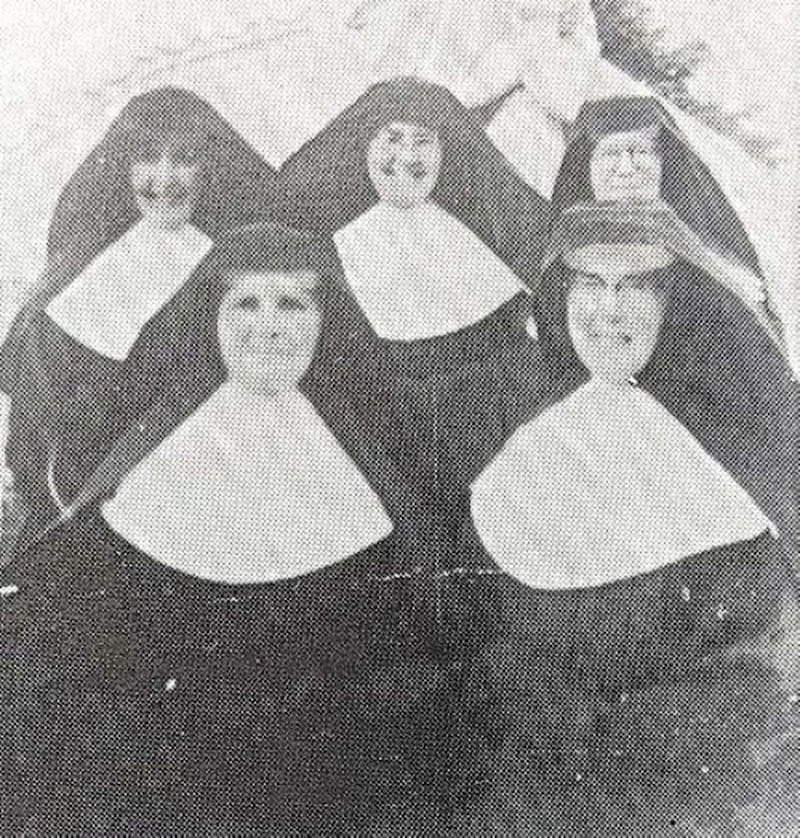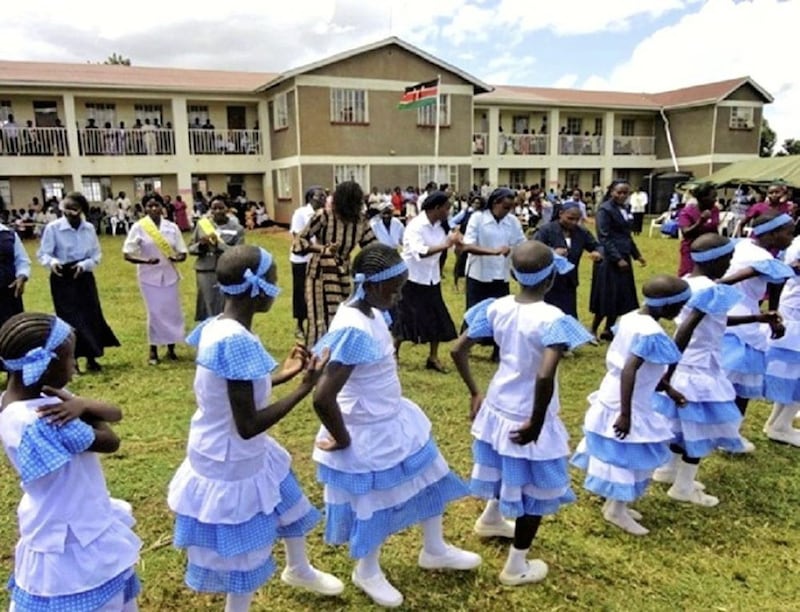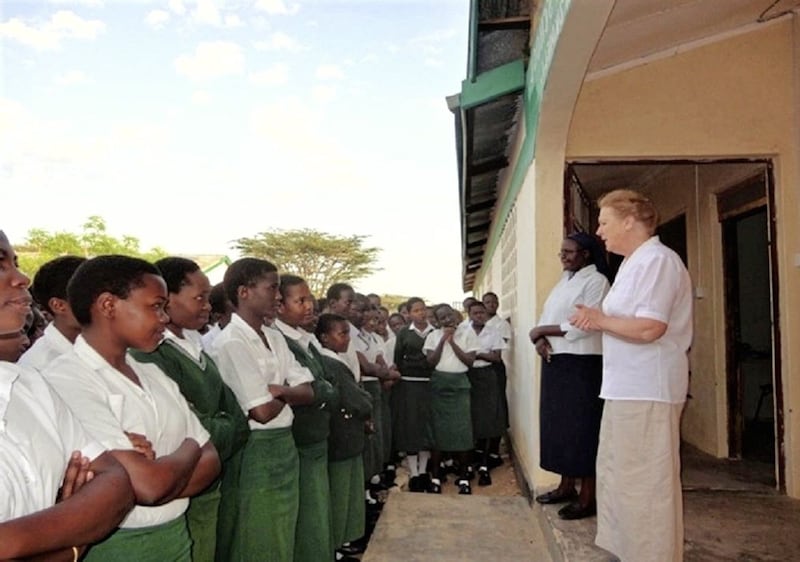TWO events last year highlighted significant changes for the Ursulines in Ireland: the decision to close the congregation's convent in Blackrock in Cork City, which is linked to their foundation in the country, and the community they started in Kenya more than 60 years ago reaching a milestone in its formal transition to become its own province.
These changes took place as the order was due to mark the 250th anniversary of the arrival of the first Ursulines in Ireland. Commemorations were bittersweet, as they were severely curtailed by the coronavirus pandemic.
"We had plans but we just had to put them on hold," said Sr Anne Harte Barry, provincial in the Ireland-Wales region. Some online gatherings marked Venerable Nano Nagle's decision to send young Irish women to do their formation with the Ursulines in Paris, which resulted in the first four Ursulines landing in Cork in 1771.
Nagle later founded the Presentation Sisters in 1775, frustrated that Ursuline enclosure prevented the sisters from going to schools outside the confines of their convent.
The Blackrock convent that is closing was built to provide a modern and more user-friendly environment for an ageing community following the sale of the Ursuline's historic 18th century convent and former boarding school in 2001. The decision to close this newer facility came as the Ursuline community in the country dropped to just over 50 members.
But while the Ursulines in Ireland are challenged by a lack of vocations and an ageing profile, the community they founded in Kenya is thriving.
This was recognised in a ceremony on March 27 2021 when the Ursuline mission in Kenya changed its status and ceased to be part of the community's Ireland-Wales-Kenya province.
During the ceremony, Sr Susan Flood, prioress general of the Roman Union of Ursulines, formally established Kenya as a 'Group in Transition to Province'.
Kenya will soon become a full province in its own right under the auspices of the Roman Union, which the Irish Union of Ursulines joined on January 27 2018.
"This type of evolutionary process is in keeping with the pattern of many other religious orders that were founded in one country and establish a province or mission in another country and culture," said Sr Patricia Wittberg, a Sister of Charity of Cincinnati and a research associate at the Center for Applied Research in the Apostolate at Georgetown University in Washington, D.C.
"There eventually comes a time when either the province becomes a separate order or else the leadership at the provincial level or even of the original order is also drawn from that country," she said.
She noted that this happened in congregations in the United States, for instance, with the Sisters of Providence in Terre Haute, Indiana, splitting from the motherhouse in France, and numerous US Benedictine orders splitting from the founding monasteries in Germany, and many other instances.
"It would be expected to happen with the Ursulines and their Kenyan sisters, too," she said.
The links between Ireland and Kenya remain strong as there are still one or two sisters in every Irish Ursuline house who spent time on mission there, Sr Anne explained.
"There is a strong friendship, connection and interest in Kenya. We supported them through the years with sound formation and by putting in place structures geared towards financial sustainability," she said.
The sisters in Kenya are "following the route we would have set out. From the very beginning, there were sisters involved in education and in health care and they have continued that route, by and large. The majority of sisters in Kenya are working in government schools and hospitals and some work for NGOs."
Speaking from Kenya, Sr Teresia Muhuhu, group leader during the transition, said only one Irish Ursuline remains in Kenya: Sr Clare Ursula Tobin, who is in her 70s.
Sr Clare runs St Columba's Technical Training College in Kitui County and is involved in succession planning; a Kenyan sister will take responsibility of the college soon. Sr Clare has "interprovincial service" status.
Among the 40 Kenyan sisters, the oldest is 58 and the youngest is 21, Sr Teresia said. "We have 20 finally professed sisters, and the rest are junior sisters, novices and aspirants," she added. "Every year about two join us. We are growing."
Kenya's move toward provincial status is seen as a very positive step that recognises "the maturity and experience of the region, and the possibilities within the region," according to Sr Anne.

The mission in Kenya began in October 1957 with the arrival of four Irish Ursulines in Mutune in the Kitui Diocese, about 105 miles southeast of Nairobi.
Sr Teresia said the first Irish Ursulines quickly got involved in teaching, health care and pastoral ministries. That work continues today through St Ursula's dispensary in Kitale. The Ursulines have also provided health services in Kitui, Lodwar, Kitale and Nairobi.
The Ursuline sisters were invited to work with COGRI, the Children of God Relief Institute in 2012. The Institute runs the Lea Toto community-based project in Nairobi County and Nyumbani Village program in Kitui County. These projects support orphans and vulnerable children, as well as provide HIV care and treatment services for children.
"In our ministries we target the marginalised: the poor, the orphaned, women, HIV/Aids victims," Sr Clare said.
"We attract people from all sectors of society which gives our Ursuline institutions a good 'mix' of economic, tribal and religious groups from all over Kenya."
Over the years, those efforts started by the founding sisters have grown. In Kitui, a semi-arid country of the Kamba people, St Angela's Secondary School, which began in 1958, is a boarding school that now educates over 600 pupils.
With charitable donations from Ireland, the sisters also established St Columba's Technical Training College, which offers courses on skills such as hairdressing, beauty, therapy, fashion design and garment-making as well as food production.
"In 1957 when they arrived, the need was education," Sr Teresia explained. "At the time, these missionaries were covering new ground by bringing education to the Kamba people. Today, there is still a need for education.
"In response to famine, they fed children and people and provided basic needs like clothing. There is still famine and medical needs, but the government is more involved. There are still very many poor people in Kenya."
One Kenyan Ursuline who is a primary school teacher at Forest Primary School in Trans-Nzoia County, "a very poor school," organises a daily breakfast club that ensures that schoolchildren are fed porridge every morning, Sr Teresia said.
This public school is run by the government, while the sister is a staff member employed by the government. The congregation has supported her work building several classes as well as the breakfast programme. The breakfast club is funded by donations from Ursuline Associates in Ireland.
"We are trying to answer the needs of the less privileged living in poverty," Sr Teresia said.
"Our sisters continue to work in poor public primary schools and hospitals. In some cases, they are now employed by the government. The sisters working in government schools and hospitals, amid a myriad of challenges, offer their best to the students and patients. These small contributions do make a huge impact. The small mustard seed grows into a big tree."

The sisters were also instrumental in setting up schools like Mutito Boys Secondary School and Mutune Girls Primary School in Kitui. Today these are run by the government, though there is still a close link between the schools and the Ursulines, with some sisters working as teachers in them.
Other schools linked to the Ursulines in Kenya include St Ursula Primary School, Kitale, Turkana Girls Secondary School, Lodwar, and Forest Primary School in Trans-Nzoia County.
The Ursulines in Kenya started to provide formation to local women in the 1980s, as some girls they had educated, impressed by the lives of the Irish sisters, asked to join them.
"When the Ursulines first came to Kenya, they did not have any intention of taking any young Kenyan girls," Sr Teresia said.
"But by 1981 some of the girls attending the secondary school in Turkana had expressed the desire to follow in the footsteps of Sr Enda Moran and Sr Mary McHugh."
Both sisters were involved in the formation of young Kenyan sisters. Sr Mary, who spent most her ministerial life in Kenya, was the first principal of Turkana Girls School, the first secondary school for girls in the Turkana Desert.
Sr Mary is now based in Ireland. After retirement in Ireland, Sr Enda went on mission to Turkana. She later returned to Ireland, where she died in 2010. A process of discernment was undertaken and by 1985 the formation began.
Kenyan members brought a new approach, Sr Teresia explained: "We are Kenyan. We have the language, and we are among our people."
As the new millennium dawned, Kenyan sisters gradually took on leadership roles; by 2007, all these roles were in the hands of Kenyans. Sr Teresia is the third Kenyan leader since that handover, after Sr Pamela Kiraithe and Sr Rose Wasike.
"Together with the Irish Sisters we decided to join the Roman Union," she said. Now the sisters in Kenya deal directly with leadership in Rome. "Rome has been looking at our governance and financial sustainability. We have a financial plan in place."
In Kenya, Sr Teresia said, the Ursulines' impact in places like Kitale, Nairobi, Kitui and Lodwar in the Turkana desert, is evident in the experiences of people, including teachers, medics and lawyers, who recount that the sisters not only brought education and healing, but also fed and clothed them.
In the late 1950s, the Ursulines from Ireland saw protecting and educating women and girls in Kenya as an urgent need.
That emphasis on education was in keeping with the Ursulines' focus in Ireland, where they have been very involved in educating women. "The vast majority would have been involved at one level or another in education ministry or supporting it," Sr Anne said.
"We had boarding schools, as well as primary and secondary schools. We moved our secondary schools into the free scheme in the 1960s."
Free second-level education was introduced in Ireland in September 1967. Most Catholic secondary schools joined the program, which was a turning point in Irish education.
The number of pupils in post-primary schools rose rapidly from 148,000 in 1967 to 239,000 by 1974, an increase of over 60 per cent.
The Ursulines also set up St Angela's College in Sligo, a third-level institution now affiliated with University College Galway, which offers undergraduate and postgraduate courses in nursing, health sciences and disability studies, home economics and education.
A number of years ago the Ursulines placed their Irish schools under the patronage of the Le Chéile Schools Trust, an umbrella body comprising the schools of 15 religious congregations in Ireland, which safeguards members' ethos and vision of Catholic education.

As the congregation shrinks, members are assessing how to address other needs. "We are also looking at things like archives and all aspects of life to see how we put in place secure structures for ourselves going forward," Sr Anne said.
These include care for elderly sisters and "finding meaningful involvement in life and mission according to our interests, energies and, above all, the needs around us".
Sr Teresia believes the future is bright for the Kenya community as it prepares to become a province in two years because "we have young people coming who are educated" and because Kenya is now part of the Roman Union of Ursulines.
"I feel we have an identity as Ursulines in the global world. And thanks to the Irish Ursulines we have had good formation and preparation for leadership. They have handed over good structures of governance and financial systems."
Sr Anne believes the Ursulines have provided a significant legacy in Ireland, Wales and Kenya. "I think we offered a breadth of opportunity and of vision to women and girls that wouldn't have been available otherwise," she said.
"We are living in an era where our whole experience of the Divine and religion is changing. I think religious life is declining in the form that it has had over past centuries, but it will re-emerge in some new, relevant expression.
"Hopefully, what we are doing now is part of the seeding of what will come next."
With thanks to Global Sisters Report. Sarah Mac Donald is a freelance journalist based in Dublin. A project of National Catholic Reporter, Global Sisters Report writes about Catholic sisters around the world.



